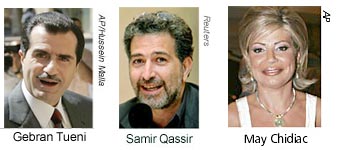New York, May 31, 2007—The Committee to Protect Journalists welcomes the U.N. Security Council’s establishment of an international criminal tribunal empowered to prosecute individuals responsible for a series of deadly attacks against Lebanese journalists in 2005.
The Security Council approved resolution 1757 on Wednesday, establishing an international criminal tribunal to prosecute the masterminds of the assassination of former Lebanese Prime Minister Rafiq al-Hariri, who was killed along with 22 others in a Beirut bombing in February 2005. The resolution indicates that the tribunal would have jurisdiction over the cases of several journalists and political figures targeted for assassination prior to and following al-Hariri’s murder.
“If the tribunal finds that other attacks that occurred in Lebanon between 1 October 2004 and 12 December 2005, or any later date decided by the parties and with the consent of the Security Council, are connected in accordance with the principles of criminal justice and are of a nature and gravity similar to the attack of 14 February 2005, it shall also have jurisdiction over persons responsible for such attacks,” the resolution’s annex read.
”By empowering this tribunal to prosecute the perpetrators of egregious attacks on the press, the Security Council has sent a strong message that the international community will not tolerate impunity for those who ruthlessly target journalists for death,” said CPJ Executive Director Joel Simon. “The Lebanese government and the United Nations should vigorously pursue their investigations into these attacks on our colleagues and ensure that those responsible are identified and fairly tried.”
After al-Hariri’s death, three journalists were among those targeted by unknown assailants in a chilling string of attacks. The cases remain unsolved.
• Samir Qassir, a prominent columnist for the daily Al-Nahar, was killed on June 2, 2005, when a bomb exploded in his car in East Beirut. A leading figure in the Democratic Left movement, Qassir wrote extensively about the need for Lebanese independence from Syrian influence. He challenged the security order in Lebanon and highlighted the inability of Syrian President Bashar al-Assad to bring about real political reform.
• May Chidiac, a political talk-show host with the Lebanese Broadcasting Corporation and a strong critic of Syria, lost an arm and a leg on September 25, 2005, when a bomb exploded under the driver’s seat of her car near the port city of Jounieh.
• Gebran Tueni, Al-Nahar managing director and columnist, was killed by a bomb that targeted his armored vehicle in east Beirut. Tueni was a member of parliament and harsh critic of Syrian policies. He was killed on December 12, 2005—the day he returned home from Paris, where he had spent considerable time because of fears for his safety. In December 2005, the Security Council passed a resolution authorizing the International Independent Investigation Commission probing the al-Hariri killing to “extend its technical assistance” to Lebanese authorities for their investigations into attacks on journalists and other political figures over the past year. It also called on then-U.N. Secretary-General Kofi Anan to “present recommendations to expand the mandate of the Commission to include investigations of those other attacks.”
